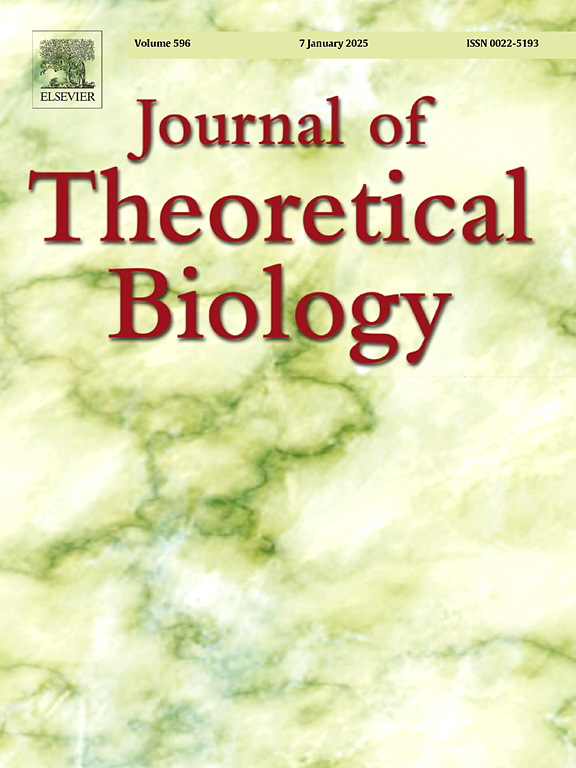基于代理的进化博弈动力学揭示了资源异质性在合作进化中的双重作用。
IF 1.9
4区 数学
Q2 BIOLOGY
引用次数: 0
摘要
合作是社会和谐和群体成功的基石。提供资源可用性信息的环境反馈在鼓励合作方面起着至关重要的作用。以往的研究表明,资源异质性对合作的影响取决于在某种情况下为自身利益采取行动的动机,这表明资源异质性既有可能阻碍合作,也有可能促进合作。然而,人们对这一现象背后的进化驱动因素知之甚少。利用基于代理的建模和博弈论,我们探索了不同环境中资源可用性的差异如何影响合作的进化。我们的研究结果表明,当资源补充缓慢时,资源差异会阻碍合作,而当资源更容易获得时,则会支持合作。此外,不同场景下的模拟表明,在不同的进化动态下,辨别自然选择作用于策略的速度有助于阐明资源变异与合作之间错综复杂的关系。当进化力量强大时,资源异质性往往不利于合作,而当选择条件宽松时,资源异质性又能促进合作。受这些发现的启发,我们还提出了在多代理强化学习中通过策略优化提高人工智能系统性能的潜在应用。这些探索为理解社会生物的进化以及不同互动对自然系统功能的影响提供了一个新的视角。本文章由计算机程序翻译,如有差异,请以英文原文为准。
Agent-based evolutionary game dynamics uncover the dual role of resource heterogeneity in the evolution of cooperation
Cooperation is a cornerstone of social harmony and group success. Environmental feedbacks that provide information about resource availability play a crucial role in encouraging cooperation. Previous work indicates that the impact of resource heterogeneity on cooperation depends on the incentive to act in self-interest presented by a situation, demonstrating its potential to both hinder and facilitate cooperation. However, little is known about the underlying evolutionary drivers behind this phenomenon. Leveraging agent-based modeling and game theory, we explore how differences in resource availability across environments influence the evolution of cooperation. Our results show that resource variation hinders cooperation when resources are slowly replenished but supports cooperation when resources are more readily available. Furthermore, simulations in different scenarios suggest that discerning the rate of natural selection acts on strategies under distinct evolutionary dynamics is instrumental in elucidating the intricate nexus between resource variability and cooperation. When evolutionary forces are strong, resource heterogeneity tends to work against cooperation, yet relaxed selection conditions enable it to facilitate cooperation. Inspired by these findings, we also propose a potential application in improving the performance of artificial intelligence systems through policy optimization in multi-agent reinforcement learning. These explorations promise a novel perspective in understanding the evolution of social organisms and the impact of different interactions on the function of natural systems.
求助全文
通过发布文献求助,成功后即可免费获取论文全文。
去求助
来源期刊
CiteScore
4.20
自引率
5.00%
发文量
218
审稿时长
51 days
期刊介绍:
The Journal of Theoretical Biology is the leading forum for theoretical perspectives that give insight into biological processes. It covers a very wide range of topics and is of interest to biologists in many areas of research, including:
• Brain and Neuroscience
• Cancer Growth and Treatment
• Cell Biology
• Developmental Biology
• Ecology
• Evolution
• Immunology,
• Infectious and non-infectious Diseases,
• Mathematical, Computational, Biophysical and Statistical Modeling
• Microbiology, Molecular Biology, and Biochemistry
• Networks and Complex Systems
• Physiology
• Pharmacodynamics
• Animal Behavior and Game Theory
Acceptable papers are those that bear significant importance on the biology per se being presented, and not on the mathematical analysis. Papers that include some data or experimental material bearing on theory will be considered, including those that contain comparative study, statistical data analysis, mathematical proof, computer simulations, experiments, field observations, or even philosophical arguments, which are all methods to support or reject theoretical ideas. However, there should be a concerted effort to make papers intelligible to biologists in the chosen field.

 求助内容:
求助内容: 应助结果提醒方式:
应助结果提醒方式:


